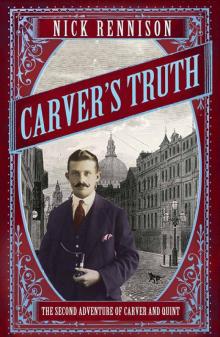- Home
- Nick Rennison
Sherlock's Sisters Page 2
Sherlock's Sisters Read online
Page 2
Mrs Bevan’s return a few moments later with the news that her pendant had disappeared, confirmed the supposition that some professional thief must have been at work, and the police were at once communicated with. They were also strictly enjoined to keep the matter a profound secret, for various reasons.
But Mrs Bevan was too anxious to rely entirely upon the exertions of the regular force, hence her application to our firm and her urgent entreaty that I would act with the utmost despatch.
Soon after my client’s departure I sought an interview with Madame von Auerbach, but could glean very little useful information. The invitations had been sent out with great care, but their exclusiveness was negatived by the fact that they were all sent to So-and-so and friend. The position of those invited by name had been considered sufficient guarantee of the perfect suitability of the friends whom they might select to accompany them to the Embassy, and at least a score of people had been present of whom the hostess barely heard even their names.
Of course, no one could treat any single one of these individuals as suspects without some definite suspicion to work upon, and, unfortunately for our prospects of success, there was not the slightest ground for suspecting anyone in particular.
I was about to quit Madame von Auerbach’s house when a servant entered with a card upon a waiter, and upon hearing that the name inscribed thereon was that of one of the guests of the previous evening, I hastily decided to stay a little longer, and requested Madame von Auerbach to keep my vocation a secret from her visitor.
The next minute a most bewitching little woman was ushered into the room.
‘Oh, my dear madame!’ she exclaimed, with a charming foreign accent. ‘Such an unfortunate thing! I lost my beautiful diamond clasp last night. Have your servants seen anything of it?’
Madame von Auerbach turned pale, and I looked with augmented interest at the harbinger of this new development of the previous evening’s mystery. The depredations had evidently been on a large scale, and the depredators had shown remarkably good taste in the choice of their spoil. The latest victim was a French lady named Madame Duchesne, and she waxed eloquent in lamentations over her loss when it was shown to her how little hope there was of recovering her diamond clasp.
‘And do you know, I feel so terribly upset,’ was her pathetic protest, ‘that I would give anything not to have had to go on with my own garden party tomorrow. And I don’t like to say it, but it is a fact I also may have included the thief in my invitation, and it would be awful if more things were to be stolen. Whatever shall I do?’
As no practical advice seemed to be forthcoming, Madame Duchesne studied for a moment, and then announced her intention of employing a detective.
‘Not a real, horrid policeman,’ she averred, ‘but one of those extraordinary individuals who seem able to look through and through you, and who can find anything out. Private detectives, I think they call them.’
Madame von Auerbach looked up eagerly, but I gave her a warning glance which caused her to postpone the revelation of my identity which she had felt prompted to make.
‘Do you know any of these people?’ was the Frenchwoman’s appeal to me. ‘Can you help me to the address of one?’
‘There are several firms of private detectives in London, if we are to judge from their advertisements,’ I answered. ‘I have heard Messrs Bell and White, of Holborn, spoken of as fairly good, but, of course, there are plenty of others equally good, or probably better.’
‘Bell and White, Holborn. Yes, I will try them. Thank you so much for helping me. May I ask if you live in London?’
Seizing my cue, Madame von Auerbach promptly came to my assistance.
‘I am very angry with Miss Gresham,’ she averred. ‘Since she resigned her post as governess to the Duke of Solothurn’s children, she has hardly deigned to take any notice of the numerous friends she made in Germany. But I mean to make her stay a few days with me, now that she has come to see me.’
‘Then you must bring her with you to my garden party,’ said Madame Duchesne, and the invitation so cleverly angled for was accepted with a faint pretence of hesitation at the idea of inflicting myself upon the hospitality of a total stranger.
After Madame Duchesne’s departure I congratulated Madame von Auerbach very warmly upon her tact and presence of mind, and arranged to visit the garden party as her friend the next day.
In due course the interesting function was in full swing, and the fascinating hostess had quite a crowd of guests to look after. My guarantor had left me, at my own request, to my own devices. I wanted to look about me, and to note all that was going on, without being too much in evidence myself.
Presently Madame Duchesne approached me with a very mysterious air, and introduced a very handsome man to my notice. ‘Don’t be shocked,’ she whispered. ‘But this is the private detective, Mr Bell. I communicated with him at once after leaving Madame von Auerbach’s yesterday, and he is here to watch that no pickpocket secures booty here. Isn’t it too dreadful to have to take such precautions? I will never give another party in London!’
I responded to this confidential communication with due sympathy, and gravely acknowledged the attention my new companion bestowed upon me for a few moments. And I had need of my gravity and presence of mind. For the man introduced to me was not my uncle, the detective. I knew that our firm had not been applied to by Madame Duchesne, in spite of her assertion to the contrary, and as this was certainly no one who had ever been in our office, I knew that certain suspicions that I had formed yesterday were likely to be verified. Since this stranger was certainly no detective, I concluded that he was merely posing as one for the sake of diverting suspicion from the offenders whom I was anxious to run to earth. The assumption that he was the associate and helpmate of the thieves was also a very natural one, although a glance at the lovely hostess and her dainty surroundings almost seemed to belie such a supposition.
But I knew that I was on the right track, and within the hour my vigilance was rewarded. The sham detective, whose pretended avocation had been disclosed to none but Madame von Auerbach and myself, sauntered from group to group, as if intent upon scrutinising their actions. His real object was to attach their jewellery, and I had the satisfaction of seeing him possess himself of a costly watch which Lady A was wearing in somewhat careless fashion. Instant denunciation was not my intention. I meant to probe the matter to the root, and followed Mr Bell’s movements with apparent nonchalance. Presently he culled a couple of beautiful standard roses, and handed them to Madame Duchesne with a graceful compliment.
The thing was beautifully done, and none but a person keenly on guard would have noticed that the watch changed hands with the roses. This little comedy over, Madame sauntered towards the house, and, five minutes later, I came upon her, quite by accident, of course, just as she was relocking a dainty cabinet from which she had taken a fresh bottle of perfume, in the use of which she was very lavish.
There were two or three other people in Madame’s charming boudoir, among them being Madame von Auerbach, by whose side I seated myself with an air of sudden weakness.
She was really startled by the development of events, but she had been previously cautioned, and played her part very well indeed, when I exclaimed that I felt dreadfully ill.
‘What shall I do?’ she cried. ‘I hope it is not one of your old attacks.’
‘Yes, it is,’ I whispered, faintly. ‘Do send for my uncle. He is the only one who can help me.’
I was promptly placed on the couch, and dosed with all sorts of amateur remedies, pending the arrival of my uncle, who had been sent for in hot haste, and who, entre nous, was waiting with a police officer in private clothes for the expected urgent summons. No sooner did they appear than my indisposition vanished, and I astonished the bystanders by springing vigorously to my feet.
‘Arrest Madame Duchesne,’ I cried, ‘and
her accomplice.’ Pointing to the latter, I continued, ‘That man has stolen Lady A’s watch, and it is locked in that cabinet.’
What a scene of confusion there was immediately. Not only Lady A, but several other people discovered that they had been robbed, and the cabinet was found to contain a great quantity of stolen valuables, among them being Mrs Bevan’s much-prized pendant.
My discovery was only made in the nick of time. In another twelve hours the birds would have flown, for the real Madame Duchesne, the lady from whom they had stolen the letters of introduction which had obtained them the entree to London society, had arrived in London that day. An accomplice had warned them of the fact, and as they knew that this garden party they were giving at the gorgeous house they had hired would be their last opportunity for some time, they had determined to make a large haul and decamp that same evening.
Luckily for many people, I was able to frustrate their intention. At present they are lodging in infinitely less luxurious quarters, and several members of the upper classes are much more careful than formerly as to whom they associate with by virtue of letters of introduction.
LOVEDAY BROOKE
Created by Catherine Louisa Pirkis (1839-1910)
In 1893, the same year that Conan Doyle attempted to despatch Sherlock Holmes by supposedly sending him over the Reichenbach Falls (the character was, of course, to be resurrected later), a new detective appeared in the pages of The Ludgate Monthly. Sometimes known (slightly misleadingly) as ‘the female Sherlock Holmes’, Loveday Brooke was the heroine of half a dozen stories which were subsequently gathered together in a volume entitled The Experiences of Loveday Brooke, Detective. She is one of the most interesting and appealing of late Victorian female detectives. A professional who works for a Fleet Street Detective Agency, she shows resourcefulness when she is sent under cover (as she is in several of the stories) and confidence in her own ability to discover the truth about the crimes she is investigating. The character, a woman making her way successfully in a world usually the preserve of men, was created by Catherine Louisa Pirkis, the wife of a Royal Navy officer, who had taken up writing in her late thirties. Her first novel, entitled Disappeared from her Home, was published in 1877 and was followed by more than a dozen others, offering readers a mixture of melodrama, mystery and romance. She was also a regular contributor of short stories to the periodical press. After the publication of the tales of Loveday Brooke, Pirkis largely gave up writing in favour of charitable work. She and her husband were active in the anti-vivisection movement and were among the founders of the National Canine Defence League.
THE REDHILL SISTERHOOD
‘THEY want you at Redhill, now,’ said Mr Dyer, taking a packet of papers from one of his pigeon-holes. ‘The idea seems gaining ground in manly quarters that in cases of mere suspicion, women detectives are more satisfactory than men, for they are less likely to attract attention. And this Redhill affair, so far as I can make out, is one of suspicion only.’
It was a dreary November morning; every gas jet in the Lynch Court office was alight, and a yellow curtain of outside fog draped its narrow windows.
‘Nevertheless, I suppose one can’t afford to leave it uninvestigated at this season of the year, with country-house robberies beginning in so many quarters,’ said Miss Brooke.
‘No; and the circumstances in this case certainly seem to point in the direction of the country-house burglar. Two days ago a somewhat curious application was made privately, by a man giving the name of John Murray, to Inspector Gunning, of the Reigate police – Redhill, I must tell you is in the Reigate police district. Murray stated that he had been a greengrocer somewhere in South London, had sold his business there, and had, with the proceeds of the sale, bought two small houses in Redhill, intending to let the one and live in the other. These houses are situated in a blind alley, known as Paved Court, a narrow turning leading off the London and Brighton coach road. Paved Court has been known to the sanitary authorities for the past ten years as a regular fever nest, and as the houses which Murray bought – numbers 7 and 8 – stand at the very end of the blind alley, with no chance of thorough ventilation, I dare say the man got them for next to nothing. He told the Inspector that he had had great difficulty in procuring a tenant for the house he wished to let, number 8, and that consequently when, about three weeks back, a lady, dressed as a nun, made him an offer for it, he immediately closed with her. The lady gave her name simply as “Sister Monica”, and stated that she was a member of an undenominational Sisterhood that had recently been founded by a wealthy lady, who wished her name kept a secret. Sister Monica gave no references, but, instead, paid a quarter’s rent in advance, saying that she wished to take possession of the house immediately, and open it as a home for crippled orphans.’
‘Gave no references – home for cripples,’ murmured Loveday, scribbling hard and fast in her notebook.
‘Murray made no objection to this,’ continued Mr Dyer, ‘and, accordingly, the next day, Sister Monica, accompanied by three other Sisters and some sickly children, took possession of the house, which they furnished with the barest possible necessaries from cheap shops in the neighbourhood. For a time, Murray said, he thought he had secured most desirable tenants, but during the last ten days suspicions as to their real character have entered his mind, and these suspicions he thought it his duty to communicate to the police. Among their possessions, it seems, these Sisters number an old donkey and a tiny cart, and this they start daily on a sort of begging tour through the adjoining villages, bringing back every evening a perfect hoard of broken victuals and bundles of old garments. Now comes the extraordinary fact on which Murray bases his suspicions. He says, and Gunning verifies his statement, that in whatever direction those Sisters turn the wheels of their donkey-cart, burglaries, or attempts at burglaries, are sure to follow. A week ago they went along towards Horley, where, at an outlying house, they received much kindness from a wealthy gentleman. That very night an attempt was made to break into that gentleman’s house – an attempt, however, that was happily frustrated by the barking of the house-dog. And so on in other instances that I need not go into. Murray suggests that it might be as well to have the daily movements of these sisters closely watched, and that extra vigilance should be exercised by the police in the districts that have had the honour of a morning call from them. Gunning coincides with this idea, and so has sent to me to secure your services.’
Loveday closed her notebook. ‘I suppose Gunning will meet me somewhere and tell me where I’m to take up my quarters?’ she said.
‘Yes; he will get into your carriage at Merstham – the station before Redhill – if you will put your hand out of the window, with the morning paper in it. By the way, he takes it for granted that you will take the 11.05 train from Victoria. Murray, it seems, has been good enough to place his little house at the disposal of the police, but Gunning does not think espionage could be so well carried on there as from other quarters. The presence of a stranger in an alley of that sort is bound to attract attention. So he has hired a room for you in a draper’s shop that immediately faces the head of the court. There is a private door to this shop of which you will have the key, and can let yourself in and out as you please. You are supposed to be a nursery governess on the lookout for a situation, and Gunning will keep you supplied with letters to give colour to the idea. He suggests that you need only occupy the room during the day, at night you will find far more comfortable quarters at Laker’s Hotel, just outside the town.’
This was about the sum total of the instructions that Mr Dyer had to give.
The 11.05 train from Victoria, that carried Loveday to her work among the Surrey Hills, did not get clear of the London fog till well away on the other side of Purley. When the train halted at Merstham, in response to her signal a tall, soldier-like individual made for her carriage, and, jumping in, took the seat facing her. He introduced himself to her as Inspector Gunning, reca
lled to her memory a former occasion on which they had met, and then, naturally enough, turned the talk upon the present suspicious circumstances they were bent upon investigating.
‘It won’t do for you and me to be seen together,’ he said; ‘of course I am known for miles round, and anyone seen in my company will be at once set down as my coadjutor, and spied upon accordingly. I walked from Redhill to Merstham on purpose to avoid recognition on the platform at Redhill, and halfway here, to my great annoyance, found that I was being followed by a man in a workman’s dress and carrying a basket of tools. I doubled, however, and gave him the slip, taking a short cut down a lane which, if he had been living in the place, he would have known as well as I did. By Jove!’ this was added with a sudden start, ‘there is the fellow, I declare; he has weathered me after all, and has no doubt taken good stock of us both, with the train going at this snail’s pace. It was unfortunate that your face should have been turned towards that window, Miss Brooke.’
‘My veil is something of a disguise, and I will put on another cloak before he has a chance of seeing me again,’ said Loveday.
All she had seen in the brief glimpse that the train had allowed, was a tall, powerfully-built man walking along a siding of the line. His cap was drawn low over his eyes, and in his hand he carried a workman’s basket.
Gunning seemed much annoyed at the circumstance. ‘Instead of landing at Redhill,’ he said, ‘we’ll go on to Three Bridges and wait there for a Brighton train to bring us back, that will enable you to get to your room somewhere between the lights; I don’t want to have you spotted before you’ve so much as started your work.’
Then they went back to their discussion of the Redhill Sisterhood.
‘They call themselves “undenominational”, whatever that means,’ said Gunning. ‘They say they are connected with no religious sect whatever, they attend sometimes one place of worship, sometimes another, sometimes none at all. They refuse to give up the name of the founder of their order, and really no one has any right to demand it of them, for, as no doubt you see, up to the present moment the case is one of mere suspicion, and it may be a pure coincidence that attempts at burglary have followed their footsteps in this neighbourhood. By the way, I have heard of a man’s face being enough to hang him, but until I saw Sister Monica’s, I never saw a woman’s face that could perform the same kind office for her. Of all the lowest criminal types of faces I have ever seen, I think hers is about the lowest and most repulsive.’

 American Sherlocks
American Sherlocks More Rivals of Sherlock Holmes
More Rivals of Sherlock Holmes Sherlock's Sisters
Sherlock's Sisters Carver's Truth
Carver's Truth